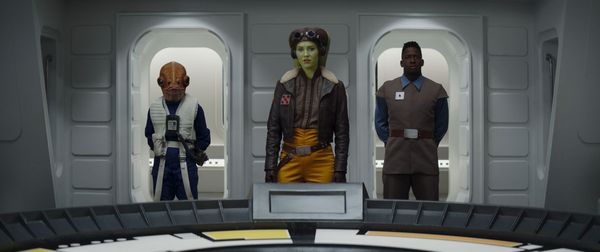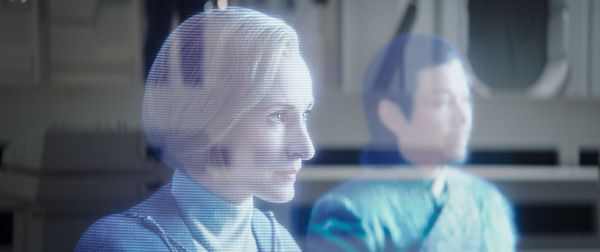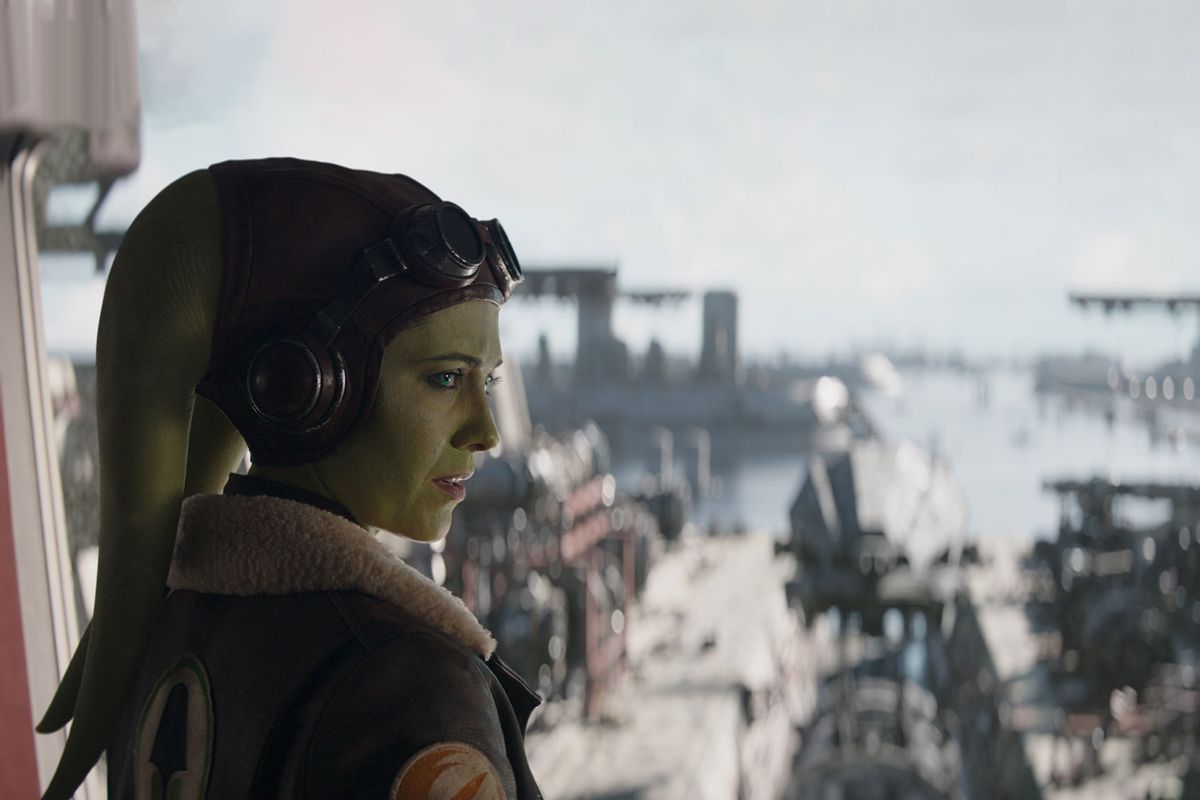General Hera Syndulla (Mary Elizabeth Winstead) can't Force choke a fool, but by the end of the fourth episode of "Ahsoka," you couldn't blame her for wishing she could.
In the limited time we've spent with the war hero, she's had her authority questioned by a guy who's essentially a Corellian salvage yard manager, Myn Weaver (Peter Jacobson) and made it through a gunfight in his workplace unscathed.
Surviving that shoot-out is no problem for Hera, especially with a Force-wielder at her side. Myn Weaver's condescension might have caused someone less steady to burst a forehead vein, though. When Hera asks to see a supposedly classified document he's holding, he tries to block her by insisting, "I'm sorry, I cannot unseal the document without authorization."
"Well, then I'm authorizing it," says the General.
"I'm not sure you can," he replies. Hera reminds him that she is a general, and authorizing declassifications is part of the gig. That's still not convincing enough for Myn, who calls a protocol droid to his side to tell him what to do.
For a story supposedly set long ago in a galaxy far, far away, "Ahsoka" has a knack for capitalizing on frustrations common to women living in the here and now, especially through Hera. Sure, Jedi Ahsoka Tano (Rosario Dawson) and her apprentice Sabine Wren (Natasha Liu Bordizzo) may wrestle with the relevancy of Jedi traditions, but Hera's struggles are familiarly mundane. There may not be a word for it in the common tongue ruling George Lucas' space opera, but here on 21st-century Earth, we know it as sexism.
Women in every workplace have contended with some jerk with a penis doubting their authority or something as simple as whether the information they're conveying is correct. Myn Weaver is the irate customer who demands that the female manager get her manager, or else what she says doesn't count. He's the guy in the E.R. who insists the woman stitching his wound can't possibly be a doctor. In this scene and others, Hera becomes the stand-in for every woman who's been challenged in situations where, if she were a man, her orders wouldn't be given a second thought.
Then again, Myn has a reason for stonewalling Hera – he's an Imperial stooge wearing the cloak of a businessman.
"My loyalty is to my investors," he claims moments before his minions try to kill her while screaming, "For the Empire!" Regardless, one wonders if old Myn would have dared toy so brazenly with a male military officer, or if he would have turned tail as soon as his ship landed.
The "Star Wars" movies deal in moral absolutes. The TV shows allow for human complexities like greed and ambition to explain how noble governments lose their footing.
Sidelining women in "Star Wars" is nothing new. Mainly it happened in the writing. Long before Disney dreamed of Din Djarin, Lucas' movies depicted women in minor roles serving the Rebellion or promoted them as the mothers or caretakers for male Jedi saviors.
A famous 2015 video created by Vulture is a supercut of all the dialogue spoken by women who aren't Leia in the first three "Star Wars" films. It comes out to around 63 seconds out of the 386 minutes that comprise "Episode IV: A New Hope," "Episode V: The Empire Strikes Back," and "Episode VI: Return of the Jedi." Most of those 63 seconds consist of dialogue delivered by Aunt Beru or the original Mon Mothma.
Similar results would probably be achieved if one were to do the same with female dialogue in the prequels for every role that isn't Natalie Portman's Amidala, but the point was made. J.J. Abrams' contributions remedied this omission somewhat through characters like Kelly Marie Tran's Rose Tico and Lupita Nyong'o's Maz Kanata, alongside Daisy Ridley's Rey.
But it wasn't until "Ahsoka" creator Dave Filoni added his lapsed Jedi and Sabine Wren to the cinematic canon, along with Hera, that it became possible, if not inevitable, to portray brazen sexism within the Republic as well as the Empire without invoking the term.
I'm sure longtime "Star Wars" fans view this as seeing something that isn't there since, to a generation of believers, the Skywalker saga is an egalitarian universe. There are women in command positions and serving other vital roles, mainly seen dashing around in the background. Leia Organa wears many titles besides princess; by the end of her life, she's also a General and a Jedi.
 Lieutenant Beyta (Dawn Dininger), Hera Syndulla (Mary Elizabeth Winstead) and First Officer Vic Hawkins (Nican Robinson) in Lucasfilm's "Star Wars: Ahsoka" (Disney+/Lucasfilm Ltd.)Only quite recently has the "Star Wars" pantheon of central players welcomed in more women than simply Leia, Amidala and Rey. Primarily that's happened through the Disney series, products of a post-Trump era where the similarities between the 45th administration's illiberalism and the Empire's overreach were and are often cited. (Donald Trump's election coincided with the release of "Rogue One: A Star Wars Story," introducing Felicity Jones' Jyn Erso, another crucial female revolutionary who was mostly ignored by the powers that be.)
Lieutenant Beyta (Dawn Dininger), Hera Syndulla (Mary Elizabeth Winstead) and First Officer Vic Hawkins (Nican Robinson) in Lucasfilm's "Star Wars: Ahsoka" (Disney+/Lucasfilm Ltd.)Only quite recently has the "Star Wars" pantheon of central players welcomed in more women than simply Leia, Amidala and Rey. Primarily that's happened through the Disney series, products of a post-Trump era where the similarities between the 45th administration's illiberalism and the Empire's overreach were and are often cited. (Donald Trump's election coincided with the release of "Rogue One: A Star Wars Story," introducing Felicity Jones' Jyn Erso, another crucial female revolutionary who was mostly ignored by the powers that be.)
The Palpatine Empire is the first example of authoritarianism that most children learn about since these stories are impressed on our consciousness at a younger age than children typically learn about World War II and Nazi Germany — or the Roman Empire, or any historically oppressive regimes that influenced Lucas' creation.
We need your help to stay independent
The "Star Wars" movies deal in moral absolutes, boiling down the battle for freedom to a matter of good battling evil with an unseen Force guiding the universe's tendency toward balance. The TV shows allow for very human complexities like greed and ambition to explain how noble governments lose their footing.
Recent franchise entries drill into the bureaucracy that enabled the rise of the Empire (as in "Andor") and the eventual weakening of the new Republic (as portrayed in the third season of "The Mandalorian"). Drawing our attention to these factors makes it increasingly difficult to portray this universe as a place where gender politics are neutralized.
Authoritarianism is an outgrowth of patriarchy, after all, which is why curtailing the rights and political power of women is among the first stages of the larger conquest plan.
Positioning Imperial loyalist Morgan Elsbeth (Diana Lee Inosanto) as Ahsoka and Hera's opponent fits that model; she's the "Star Wars" version of Rebekah Mercer and as amply resourced. That places her in a separate category than, say, Dedra Meero (Denise Gough) in "Andor," whose ruthlessness is necessitated by her need to prove herself in a male-dominated bureau.
Morgan Elsbeth may be the boss, and to her credit, she picks a Dark Jedi, Baylan Skoll (Ray Stevenson), who's mentoring a young woman named Shin Hati (Ivanna Sakhno) — good on both of them for Hiring the Future! But it's understood that Elsbeth is serving a domineering patriarchal force. The Empire thrives on order and rewards the wealthy class that serves them and stays out of their way with broad latitude to do as they please, an attractive proposal for any rich woman who'd like to maintain her status.
In this way "Ahsoka" picks up a thread of authoritarian creep "The Mandalorian" introduced in a third season subplot, showing the weakest players on the side of democracy turning a blind eye to rising evil either in the name of keeping the peace or to better solidify their political position.
Once Myn Weaver is unmasked, Filoni could have let that loyalty serve as the explanation for his gaslighting schmuckery. But a subsequent interaction with a New Republic senator dissolves the assumption that the Empire has cornered that market.
 Chancellor Mon Mothma (Genevieve O'Reilly) and Senator Xiono (Nelson Lee) in Lucasfilm's "Star Wars: Ahsoka" (Disney+/Lucasfilm Ltd.)
Chancellor Mon Mothma (Genevieve O'Reilly) and Senator Xiono (Nelson Lee) in Lucasfilm's "Star Wars: Ahsoka" (Disney+/Lucasfilm Ltd.)
Authoritarianism is an outgrowth of patriarchy, after all. Positioning Imperial loyalist Morgan Elsbeth as Ahsoka's and Hera's opponent fits that model
Hera has a powerful ally in Chancellor Mon Mothma (Genevieve O'Reilly), but the group hearing her plea for resources also includes Senator Xiono (Nelson Lee) who scoffs at everything she says. So although although Hera and Ahsoka discover a fast-moving plot to re-establish an Imperial Grand Admiral long thought to be dead in a dangerous leadership position, warning the politicians holding the purse strings gets her nowhere because a key male voice doesn't respect her.
Hera can't even engage in a friendly exchange with Mon Mothma about her child without Xiono rolling his eyes and insinuating that these nattering mommies are wasting his time.
"Were you ever in the war, Senator?" Hera asks him, which stops Xiono cold for a beat before he admits, "No." We know the type well.
"Just sat back and waited to see who came out on top?" Hera says with a furious gaze . . . to no avail. Xiono wins the crowd, forcing Hera to defy orders with a handful of X-wing pilot volunteers, including Carson Teva (Paul Sun-Hyung Lee). Together they try to reinforce a very outnumbered Ahsoka and Sabine.
Their noble intentions aren't enough to stop Morgan and her forces from completing the first phase of their mission, which is to travel to a little-known part of the universe using a hyperspace ring. The force of their jump wipes out most of Hera's companions, leaving Carson and one other.
Hera will probably take the blame for this failure despite being under-resourced because that's just how things work in an office.
Ahsoka and Sabine may grapple with their place in the universe, but every interaction Hera has with supervisors or politicians is a mud-wrestling match of diminishment to which nearly every woman who has a boss or is a boss can relate. It's good for young women to take in that lesson as early as possible so they can prepare accordingly and, like Hera, refuse to be stopped.
New episodes of "Ahsoka" premiere Tuesdays at 9 p.m. ET/6 p.m. PT on Disney+.
Read more
about "Star Wars"



Shares